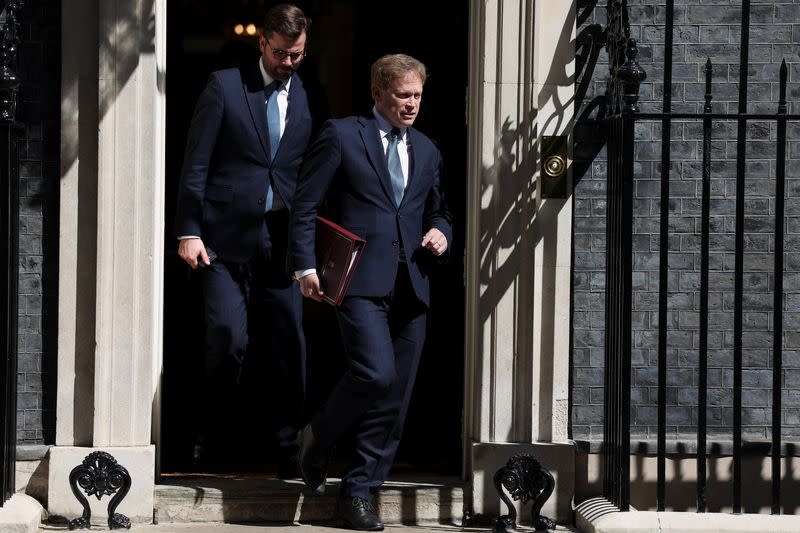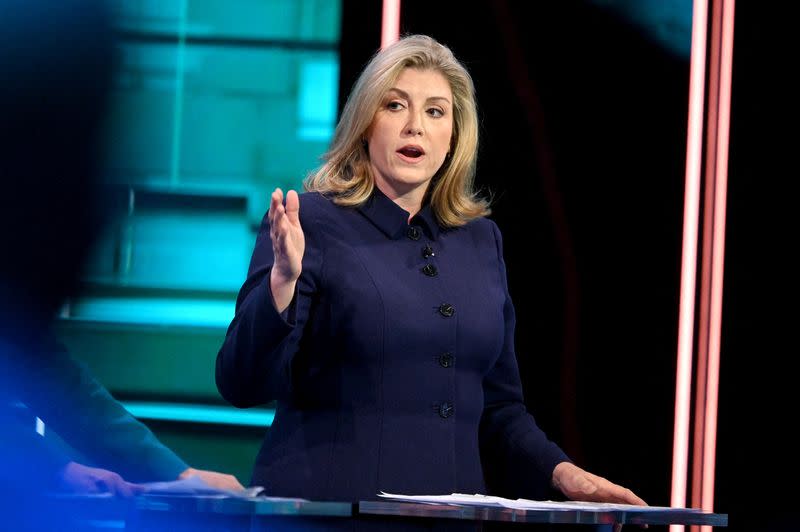'Big beasts' slayed as Conservatives suffer UK election bloodbath
By Michael Holden and Andrew MacAskill
LONDON (Reuters) -Former Prime Minister Liz Truss and defence minister Grant Shapps were among a record number of senior ministers to lose their parliamentary seats as the governing Conservative Party was swept from power in Britain's election.
Penny Mordaunt, leader of the lower house of parliament and touted as a possible future Conservative leader, was another of the 12 senior ministers voted out, surpassing the previous record of seven in 1997 when Tony Blair brought Labour to power in a landslide election victory.
After the Conservatives lost more than 200 seats, Labour was set to govern for the first time since 2010.
Shapps hit out at Conservative divisions during his concession speech, blaming his colleagues for losing the support of voters.
"We've tried the patience of traditional Conservative voters with a propensity to create an endless political soap opera out of internal rivalries and divisions, which have become increasingly indulgent and entrenched," he said.
Truss became the UK's shortest-serving leader ever in 2022 - just 44 days - when her unfunded tax cuts sparked a bond market meltdown and a collapse in sterling, raising the cost of mortgages for homeowners already struggling with living costs.
She is the first former prime minister to lose a seat in almost 100 years.
ANGER
Anger at economic stagnation, political scandals and a crisis in public services after years of government spending cuts, saw voters desert the Conservative Party, which has governed in Britain longer than any other political party.
Shapps is the most high-profile minister in Britain to lose his seat since Michael Portillo, the then defence minister in 1997, in one of the most famous moments in modern British political history.
Appointed defence minister in August last year, Shapps had held a number of jobs, running departments from transport and energy to business.
Ministers losing their seats are relatively rare in British politics. Until Thursday only four cabinet ministers had lost their seats at the last six elections over 27 years.
But there was a procession of defeats as results were announced in the early hours of Friday.
Mordaunt was responsible for the government's business in parliament and she would have been one of the leading candidates to replace Sunak should he, as is expected, step down after the crushing defeat.
Her honorary position of Lord President of the Privy Council meant she had a prominent constitutional role following the death of Queen Elizabeth in 2022, and gained worldwide fame for holding a large ceremonial sword for more than an hour during the coronation of King Charles.
Education minister Gillian Keegan, culture minister Lucy Frazer, science minister Michelle Donelan, and justice minister Alex Chalk also lost their seats.
Other casualties included Peter Bottomley, who had been the longest-serving lawmaker in parliament. The 'Father of the House' - the honorary title bestowed upon the member who had been in parliament the longest - was first elected in 1975 but lost his Worthing West seat.
Jacob Rees-Mogg, a former minister nicknamed "the honorable gentleman from the 18th century" because of his grand airs and trademark double-breasted suit, lost too.
High-profile Conservatives were not the only major political figures - dubbed 'big beasts' by British media - who were beaten.
Jonathan Ashworth, who had been expected to serve in Keir Starmer's Labour government, lost his seat to an independent candidate.
Veteran left-wing political maverick George Galloway was also beaten. He had only won his Rochdale seat for the Workers Party of Britain in March after Labour pulled support for its candidate, running on a pro-Palestinian agenda.
(Reporting by Andrew MacAskill and Michael Holden; editing by Philippa Fletcher)



